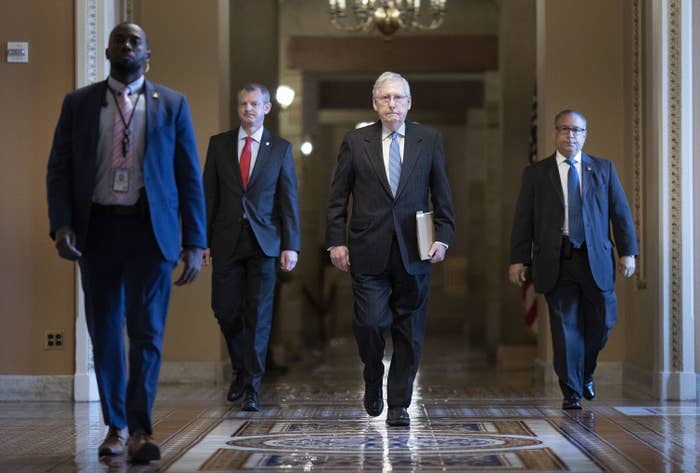
The journalists at BuzzFeed News are proud to bring you trustworthy and relevant reporting about the coronavirus. To help keep this news free, become a member and sign up for our newsletter Outbreak Today.
WASHINGTON — The Senate passed a multibillion-dollar coronavirus aid package Wednesday. It is expected to be quickly signed into law by President Donald Trump.
The Families First Coronavirus Response Act passed by a vote of 90–8. It expands Medicaid and unemployment benefits, orders free coronavirus testing, and mandates paid sick leave and childcare leave — but only for certain employees.
Many Senate Republicans criticized the package. But most held their noses and voted for it after the White House lobbied to pass the bill immediately rather than get bogged down with amendments.
“I do not believe we should let perfection be the enemy of something that will help even a subset of workers,” said Majority Leader Mitch McConnell before the bill passed on Wednesday.
The bill is projected to authorize well over $100 billion worth of aid. The Senate will now turn to negotiating a much larger aid bill — potentially worth up to $1 trillion — to save the economy, primarily focused on keeping small businesses and the airline industry afloat. An $8.3 billion spending package to fight and treat the virus passed in early March.
The House first passed the Families First Act early Saturday morning. In response to Republican objections, significant amendments were passed Monday, including limiting who will qualify for paid sick leave. The bill offers two weeks of paid sick leave to employees who have COVID-19, the disease caused by the novel coronavirus. They will be paid their entire salary, up to $511 per day (which works out to about $130,000 per year).
However, the bill contains many loopholes that allow employers not to offer sick leave. Large companies with over 500 employees are exempt, and businesses with under 50 employees can be exempted as well. Health providers such as hospitals and nursing homes are also exempt.
Do you have questions you want answered? You can always get in touch. And if you're someone who is seeing the impact of this firsthand, we’d also love to hear from you (you can reach out to us via one of our tip line channels).
Parents will be eligible for three months of paid family leave if their children’s schools are closed. Both the sick leave and family leave provisions expire at the end of the year.
House Speaker Nancy Pelosi said she will push to expand paid leave in the next funding package. That one will be designed to keep workers paid and businesses afloat at a time when the government is urging everyone to stay home and nonessential businesses to close.
A variety of measures are on the table, ranging from bridge loans to grants to Sen. Mitt Romney’s proposal to provide monthly $1,000 payments to every American adult. The Trump administration has taken up Romney’s idea, and it seems likely to be included in the next bill.
The path forward looks to be rocky and partisan. Rather than working on the aid package together, the two parties will go to their own corners to hammer out separate plans. McConnell announced Monday that Republicans would work with the White House on a Republican plan and then take it to Democrats. Making any aid package a reality means passing it through both the Republican-controlled Senate and the Democrat-controlled House.
The House is expected to work through the weekend and stay in session until the next phase of aid is agreed to. The House is currently on recess and would need to be recalled to go to a vote. Both sides have said they expect further aid packages to be necessary over the coming weeks.

